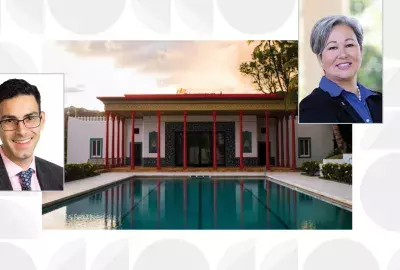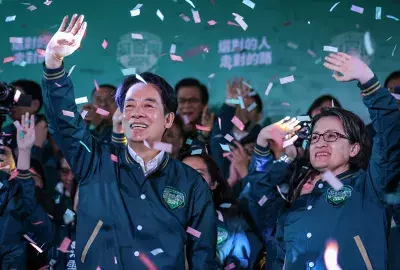Error message
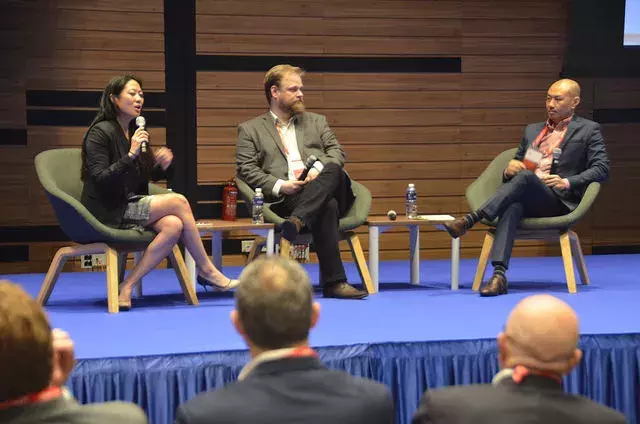
SINGAPORE (June 26, 2018)—Ongoing problems with revenue in the Internet age, rebuilding public trust and better learning to utilize new technology topped concerns for the future of news expressed by panelists at the opening session of the East-West Center’s 2018 International Media Conference in Singapore Monday. The three-day conference is being co-hosted by EWC, Konrad Adenauer Stiftung and Singapore Management University.
Joshua Benton, director of Harvard’s Nieman Journalism Lab, said that the news industry is finally coming to “belated acceptance of the fact that digital revenue will never replace print and broadcast.” The result, he said, has been “increasing reliance on the reader to pay the freight, with more and stricter paywalls.”
In some ways, Benton said, this can be beneficial, encouraging news organizations to focus on the kind of reporting that attracts tong-term monthly subscribers, rather than flashy ‘click-bait’ stories aimed at one-time online advertising. “If you want content that’s going to go viral and create the maximum amount of page views, that encourages a certain kind of journalism,” he said. “But if your goal is, ‘I want to create content that is so valuable to people that they’re willing to pay money for it every month,’ that encourages a different, and overall probably better, kind of journalism.”
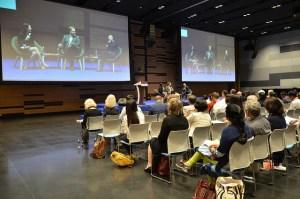
But it also means that “more and more of the bounty of information that has been on the Web for the last 20 years is going to be walled off,” Benton told moderator Irene Jay Liu, who is the Asia Pacific lead for Google News Lab. “As a result, we’ll have more and more of a premium news environment for people who have the financial means, time and interest,” while others will continue to see more random, less “civically useful” news that they “just bump into on social media because their friend posted it.”
One of the impacts of the shift to online news, Benton said, “is that we’re likely to see big winners at the national level, but it’s everything below that level that worries me. The New York Times and Washington Post are going to be fine, but that’s only a very small portion of US media. We have 1,400 daily newspapers in the US, and the online subscription model is working for only maybe six of them.”
Alan Soon, co-founder and CEO of the Singapore-based, Asia-focused media news site The Splice Newsroom, said that even more important than debating revenue models is the need for news organizations to take a fresh look at “what they have that’s valuable to people … I think a lot of news organizations still haven’t figured out exactly what they sell.”
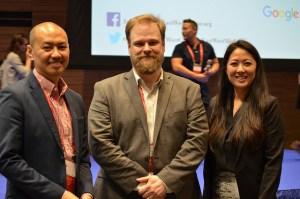
Soon told moderator Irene Jay Liu, who is the Asia Pacific lead of Google News Lab, that one of the best things companies like Google and Facebook can do to help foster quality journalism is to help news organizations better understand how to do audience targeting. “Everyone is basically still pushing content out into a digital black hole somewhere,” he said. “But with better support and training from media tech companies, we could be targeting the audiences we want. I think microtargeting is a very important way of looking at audiences that not many media companies are doing, because they don’t know how.”
Benton agreed that news organizations established before the advent of the Web “really haven’t done enough to re-evaluate the way they do what they do: their content strategies, how they format the news, the way they distribute, how they define what a beat is, what makes a story. At every step of that process, they still have a really significant hangover from way it used to be.” To be relevant in the new era, he said, these organizations need “a really vigorous re-evaluation of the thinking that goes into what they produce and how they serve the needs of their audience.”
Asked by Liu about the top-of-mind issue of restoring public trust in media, Soon said that a unique factor in places like Southeast Asia is that many people there have been going online with little previous exposure to technology and its pitfalls. “We need to be teaching people who are coming online for the first time how they can report abuse, or signal to Google and Facebook that a story is disputed—that there’s something they can do instead of just continuing to propagate it,” he said.

Benton said that “one big hole that hasn’t been filled” is the expectation in the past that news companies would always keep space set aside for “civically useful” news of the kind needed to ensure an informed electorate. As more and more people get their news from tech platforms like Google, Apple and Facebook, he said, “the focus has shifted more to going after bad actors than what was done before, to actually set aside space for affirmative creation of civically useful news. And with the move to smart phones, it’s just so much easier to ignore news than it used to be.”
His biggest technological hope for the future of journalism, he said, is that companies like Google and Apple that control smart-phone operating systems would expand their commitment to “creating built-in opportunities for people to run into civically useful news. That would be the best news innovation I could think of.”
The East-West Wire is a news, commentary, and analysis service provided by the East-West Center in Honolulu. Any part or all of the Wire content may be used by media with attribution to the East-West Center or the person quoted. To receive the East-West Center Wire articles via email, subscribe here. For links to all East-West Center media programs, fellowships and services, see www.eastwestcenter.org/journalists.
SINGAPORE (June 26, 2018)—Ongoing problems with revenue in the Internet age, rebuilding public trust and better learning to utilize new technology topped concerns for the future of news expressed by panelists at the opening session of the East-West Center’s 2018 International Media Conference in Singapore Monday. The three-day conference is being co-hosted by EWC, Konrad Adenauer Stiftung and Singapore Management University.
Joshua Benton, director of Harvard’s Nieman Journalism Lab, said that the news industry is finally coming to “belated acceptance of the fact that digital revenue will never replace print and broadcast.” The result, he said, has been “increasing reliance on the reader to pay the freight, with more and stricter paywalls.”
In some ways, Benton said, this can be beneficial, encouraging news organizations to focus on the kind of reporting that attracts tong-term monthly subscribers, rather than flashy ‘click-bait’ stories aimed at one-time online advertising. “If you want content that’s going to go viral and create the maximum amount of page views, that encourages a certain kind of journalism,” he said. “But if your goal is, ‘I want to create content that is so valuable to people that they’re willing to pay money for it every month,’ that encourages a different, and overall probably better, kind of journalism.”

But it also means that “more and more of the bounty of information that has been on the Web for the last 20 years is going to be walled off,” Benton told moderator Irene Jay Liu, who is the Asia Pacific lead for Google News Lab. “As a result, we’ll have more and more of a premium news environment for people who have the financial means, time and interest,” while others will continue to see more random, less “civically useful” news that they “just bump into on social media because their friend posted it.”
One of the impacts of the shift to online news, Benton said, “is that we’re likely to see big winners at the national level, but it’s everything below that level that worries me. The New York Times and Washington Post are going to be fine, but that’s only a very small portion of US media. We have 1,400 daily newspapers in the US, and the online subscription model is working for only maybe six of them.”
Alan Soon, co-founder and CEO of the Singapore-based, Asia-focused media news site The Splice Newsroom, said that even more important than debating revenue models is the need for news organizations to take a fresh look at “what they have that’s valuable to people … I think a lot of news organizations still haven’t figured out exactly what they sell.”

Soon told moderator Irene Jay Liu, who is the Asia Pacific lead of Google News Lab, that one of the best things companies like Google and Facebook can do to help foster quality journalism is to help news organizations better understand how to do audience targeting. “Everyone is basically still pushing content out into a digital black hole somewhere,” he said. “But with better support and training from media tech companies, we could be targeting the audiences we want. I think microtargeting is a very important way of looking at audiences that not many media companies are doing, because they don’t know how.”
Benton agreed that news organizations established before the advent of the Web “really haven’t done enough to re-evaluate the way they do what they do: their content strategies, how they format the news, the way they distribute, how they define what a beat is, what makes a story. At every step of that process, they still have a really significant hangover from way it used to be.” To be relevant in the new era, he said, these organizations need “a really vigorous re-evaluation of the thinking that goes into what they produce and how they serve the needs of their audience.”
Asked by Liu about the top-of-mind issue of restoring public trust in media, Soon said that a unique factor in places like Southeast Asia is that many people there have been going online with little previous exposure to technology and its pitfalls. “We need to be teaching people who are coming online for the first time how they can report abuse, or signal to Google and Facebook that a story is disputed—that there’s something they can do instead of just continuing to propagate it,” he said.

Benton said that “one big hole that hasn’t been filled” is the expectation in the past that news companies would always keep space set aside for “civically useful” news of the kind needed to ensure an informed electorate. As more and more people get their news from tech platforms like Google, Apple and Facebook, he said, “the focus has shifted more to going after bad actors than what was done before, to actually set aside space for affirmative creation of civically useful news. And with the move to smart phones, it’s just so much easier to ignore news than it used to be.”
His biggest technological hope for the future of journalism, he said, is that companies like Google and Apple that control smart-phone operating systems would expand their commitment to “creating built-in opportunities for people to run into civically useful news. That would be the best news innovation I could think of.”
The East-West Wire is a news, commentary, and analysis service provided by the East-West Center in Honolulu. Any part or all of the Wire content may be used by media with attribution to the East-West Center or the person quoted. To receive the East-West Center Wire articles via email, subscribe here. For links to all East-West Center media programs, fellowships and services, see www.eastwestcenter.org/journalists.
East-West Wire
News, Commentary, and Analysis
The East-West Wire is a news, commentary, and analysis service provided by the East-West Center in Honolulu. Any part or all of the Wire content may be used by media with attribution to the East-West Center or the person quoted. To receive East-West Center Wire media releases via email, subscribe here.
For links to all East-West Center media programs, fellowships and services, see www.eastwestcenter.org/journalists.





